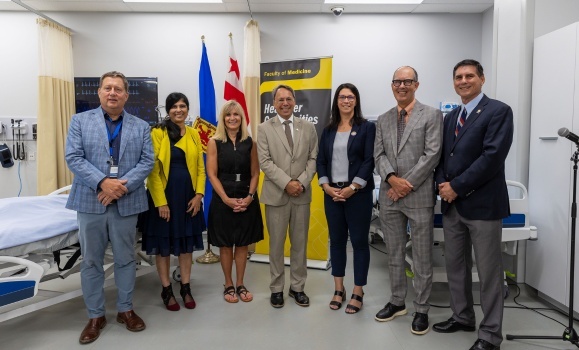Dalhousie University to begin new physician assistant training program for Nova Scotia
A new program at Dalhousie University is poised to make a significant contribution to the health and well-being of Nova Scotians.
Last Thursday (August 3), at Dalhousie’s Collaborative Health Education Building (CHEB), the Province of Nova Scotia — represented by Minister of Health and Wellness, The Honourable Michelle Thompson, and Minister of Advanced Education, The Honourable Brian Wong, along with Dean Dr. David Anderson, Faculty of Medicine — announced the development and funding of a Master of Physician Assistant Studies (MPAS) program in Dal’s Faculty of Medicine.
The first of its kind in the Maritime provinces and only the fourth in the country, the MPAS will provide graduates with the competencies needed to provide compassionate, evidence-based care and significantly contribute to interprofessional health-care teams.
“The establishment of a Master of Physician Assistant Program represents a critical step towards improving access to quality health-care services for Nova Scotians,” says Dr. Anderson, who spoke at the announcement. “By training physician assistants, we can help alleviate some of the burden faced by physicians and provide a pathway to meet the health-care needs of our communities.”
Providing collaborative care
Physician assistants are highly skilled health-care professionals who work collaboratively with physicians and other members of the health-care team to provide high-quality patient care.
Dalhousie’s MPAS training is a condensed, two-year medical curriculum preparing students for direct entry into the profession. They will receive comprehensive training in various areas such as clinical medicine, patient assessment, diagnosis, treatment planning, pharmacology, and surgical procedures. Students will also gain practical experience through clinical rotations in various health-care settings, including primary care, surgical services, medical services, psychiatric services, and emergency departments.
Physician assistants have been providing safe, competent, and efficient health care under the supervision of physicians since the 1960s in the United States and in the Canadian military. More recently, they have been identified as a valuable resource within the Canadian health-care system with significant uptake and role integration in Ontario, Manitoba, and Alberta.
“We heard from doctors that having more physician assistants would free up time, allowing them to focus on more complex issues or things that only physicians can do,” said Michelle Thompson, who is also the minister responsible for the Office of Healthcare Professionals Recruitment. “We know we need more health-care providers, and physician assistants can help provide Nova Scotians faster access to care. We are proud to be able to train physician assistants right here in Nova Scotia.”
Inaugural assistant dean
Supporting the program at Dalhousie is the newly appointed Assistant Dean, Physician Assistant Studies Dr. Michael Clory.
An emergency medicine physician, Dr. Clory has been a faculty member at Dalhousie for more than 20 years, with many years of senior administrative experience. As assistant dean, he will provide ongoing leadership, oversight, curricular innovation, and evaluation of the Physician Assistant Program and will be responsible for ensuring that the program meets accreditation standards.

